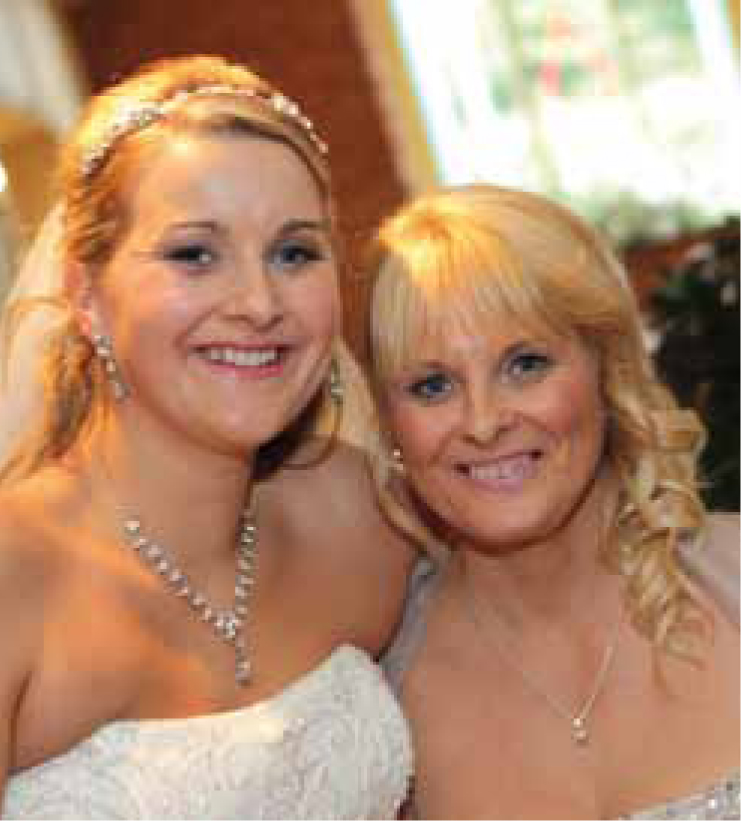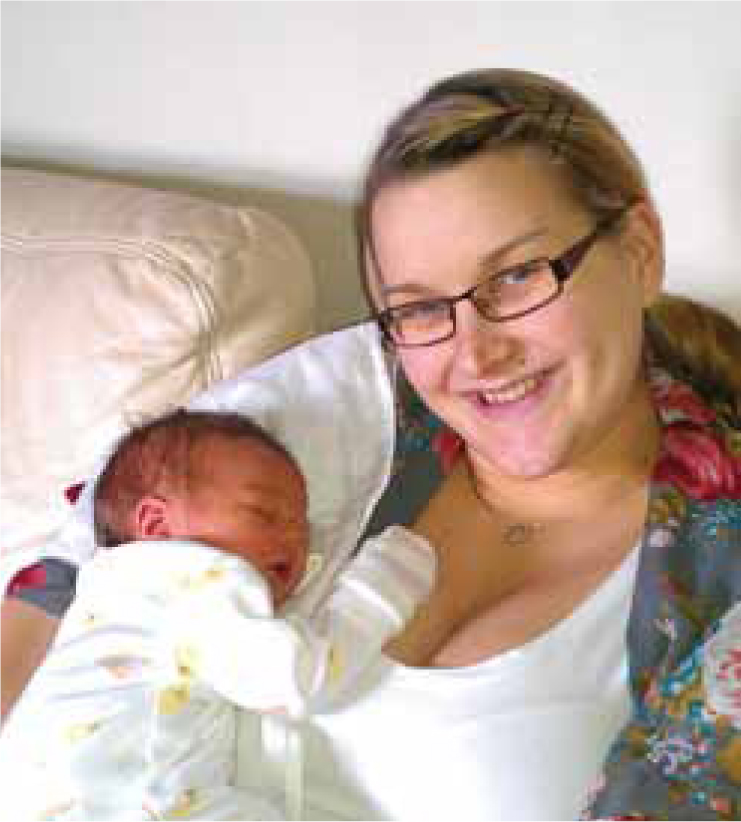Carly was a typical teenager: she loved shopping, make-up, clothes, meeting up with friends at parties and generally living life to the full. She keep fit too—joined a gym and took spinning classes.
From an early age, Carly wanted to get married and become a mother. She left school at 16 and went to work in a solicitors' office, with plans of becoming a legal secretary. But she later became a qualified electrician in a big company where she was promoted to senior planner. By the time she was 21, Carly had met her husband at work and decided he was the man for her. After 5 years together, they married and Carly had her perfect church wedding and reception in a country hotel followed by a dream 2-week honeymoon in Portugal.
During their honeymoon, Carly became pregnant and they were both thrilled. Carly struggled with morning sickness during the early months and had two spells in hospital because of it, but 4 months into her pregnancy, she was radiant and blooming.
This suddenly changed when she was 7 months pregnant. I met her in town and walking about exhausted her. At a family meal a few days later she told me she wasn't feeling ‘right’. Her heart felt like it was beating outside her body and she said she was dizzy and light-headed.
I then discovered Carly kept fainting at work. She told me her GP had detected extra heartbeats but was going to leave further tests until after the baby was born.
As the days went by, she seemed to be fainting more and she was tired all the time. If she tried to lie down, she found breathing difficult and made noises that didn't sound right at all.
Carly told me her community midwife said this was caused by the baby lying on her organs and she should lie on her left side.

Carly had planned to work right up until having the baby so she could have almost a year off after the birth. However, she had to stop working before she was 8 months pregnant because she was having repeated dizzy spells.
As she was at home, her friends visited her. They told me they were very worried about her lack of energy. She didn't seem able to walk 100 yards.
When Carly was 8 months pregnant, she fainted at her GP surgery when she was having a check-up. Carly's midwife was on holiday and she was asked if she wanted to see a different midwife or wait until her regular one was back in 10 days. She decided to wait for her usual midwife and went home.
As her due date arrived, Carly became more and more fed-up. She had no energy and complained about palpitations and numbness in one of her legs.
About 6 days after her due date, Carly received a stretch and sweep to help bring on labour. It appeared her waters had partially broken. She was sent to hospital, the baby's heartbeat was monitored and she was allowed out later that day. Carly was told not to have a bath. The plan was to begin inducing her 4 days later, but she went into labour 2 days before that.
Carly's husband took her to hospital and she was already quite far dilated. Labour progressed well but after 2.5 hours of pushing, doctors decided to use forceps. Baby George was born healthy and weighing 7 lb 11 oz.
I got there about 2 hours later and thought she looked all pumped up and dreadful. Her face was swollen and she had no colour, even in her lips, and her eyes appeared yellow. But she said she was OK.
I told the staff that she didn't look well. Her husband mentioned that she looked yellow but we were assured she was fine.
The following day she rang me in tears. She said the nurses wanted her to breastfeed but she just couldn't (although she had always planned to do this). She had tried feeding George with a bottle but found holding him and the bottle very difficult and had dropped the bottle on the floor. She said the staff wouldn't pick it up for her and in the end another new mother had got out of bed and picked it up for her. She told me she wanted to go home so her husband could care for her.
At home, over the next few days, Carly developed an irritable cough and had a lot of pain in her lower chest. She had a very swollen, cold foot and looked very pale and ill. She also started acting out of character. The midwife said the pain was due to her pushing in labour and her swollen foot was due to ‘pooling’ and was normal.
After she became more poorly, her husband took her back to hospital. It was a bank holiday weekend. She was admitted and he was told they were treating her for pneumonia or possibly a blood clot. We have since discovered cardiomyopathy was also considered, but at that time we were not told this.
Carly was given a chest X-ray, which we have found out, only recently, showed she had an enlarged heart. It also showed fluid on the lungs, which we were told about. The consultant on duty on the general ward at the time told us we would know more on the Tuesday when more staff were back. Carly was also scheduled to have an echocardiogram that day.
She was put on an assessment ward. She was very breathless and couldn't get her breath when she lay down. They propped her up and gave her an oxygen mask. They thought she might have a blood clot and she was given heparin.
Early the next morning, Carly was moved to a high-dependency unit. They were worried about her heart rate and said there would be more nurses who could look after her. She was even more odd that day, very breathless and talking strangely, which was very unlike her.
That afternoon, Carly seemed a bit better, but when her husband went that evening he said she had gone back to being strange. But staff didn't seem to think it was odd.
The following morning, the day she was due to have her echocardiogram, the staff told me on the telephone she was acting a bit strange and was agitated. I went in to see if it might help.
Carly was tossing and turning. Her feet were like ice and her bed gown was not covering her properly but she didn't seem to care. There was a midwife with her who had popped in to see how Carly was doing.
Carly complained of a pain in her chest but kept pointing at her diaphragm. She was given diazepam tablets in a little cup. She took them and then threw the cup away. Again this was very unlike her. She lay back on the pillows but said she was uncomfortable. So I tried to puff up her pillows. She told me she loved me and I said the same back. I thought her lips looked all wrong. Then she appeared to fall asleep, but because she had a hand on her eyelid one eye remained open and I could see it had turned back in her head.
I called a nurse who picked up her hand and dropped it. It just flopped. She called for a crash team and everyone came rushing.
Carly's husband, dad and other family members came to the hospital. We were told to prepare for the worst. They asked me if I would like to sit with her while they tried to stabilise her. Her husband and I sat holding her hands. It was so awful.
Then they told me they had got a heart-beat from Carly and were going to move her to intensive care and put her into a medically induced hyperthermia coma.
Once Carly was in intensive care, everything was different. They did a lot of tests, including an echocardiogram, and told me she had peripartum cardiomyopathy. They told me that women could come back from this.

When Carly was warmed up she woke up and could nod in response to questions and confirmed she was not in pain.
The doctors talked about trying to get her stable and referring her to another hospital where she would get more specialist care. But her heart stopped and they said there was nothing else they could do.
The doctor who came to tell me she had died was distraught. Doctors and nurses stood crying in the corridor, but I was numb.
I've since looked up the signs of peripartum cardiomyopathy (palpitations, chest pain, excessive fatigue, tiredness during physical activity, shortness of breath, swelling of feet and ankles) and she had them all. But I got the impression that those looking after her were mostly unaware of peripartum cardiomyopathy and its symptoms.
I know the condition is rare but if midwives, GPs and hospital staff are not aware of it, how are they going to recognise expectant or new mums who may have it?
Carly was a first-time mother so she would not have known what to expect and what wasn't normal.
There were so many people involved in her care but no one person looked at the overall picture, nor took responsibility. Throughout the later stages of her pregnancy she told different medical people about all her various symptoms. But many of the things she complained of were never put in her notes nor shared with others involved in her care. If that had been done, I believe alarm bells would have rung much earlier.
She was fed up with saying things were wrong with her, but no one really questioned her about her symptoms.
I'm told that many of her symptoms could have been put down to pregnancy, but that the severity of them and her deteriorating health should have caused concern. Too much attention was focused on the baby and not enough on her.
They say that time is a great healer, but although more than 3 years have passed, if anything, I feel worse. George's father is doing a wonderful job and George couldn't ask for a better dad. But my grandson is growing up without his mother.
I feel the family has been cheated out of seeing her become the mum she always wanted to be; particularly George who will never experience how wonderful his mother was. He will only ever know her as a person in a picture.
Despite a drop in the numbers of UK women dying in or around childbirth, many women with medical conditions, such as heart disease are still dying, the Royal College of Midwives warned recently.
And I'm told that midwives learn very little about peripartum cardiomyopathy during their training. This needs to change.
I'm telling Carly's story to raise awareness of the condition. I have also been raising money towards Cardiomyopathy UK's (formerly the Cardiomyopathy Association) cardiomyopathy in pregnancy medical conference on Friday 12 June, at the Cavendish Conference Centre, Duchess News, London.
The conference is for midwives and heart nurses and will include a session on peripartum cardiomyopathy and how to recognise it.
I hope maternity staff will attend to help save more mums and help more families from going through what we have been through. BJM

